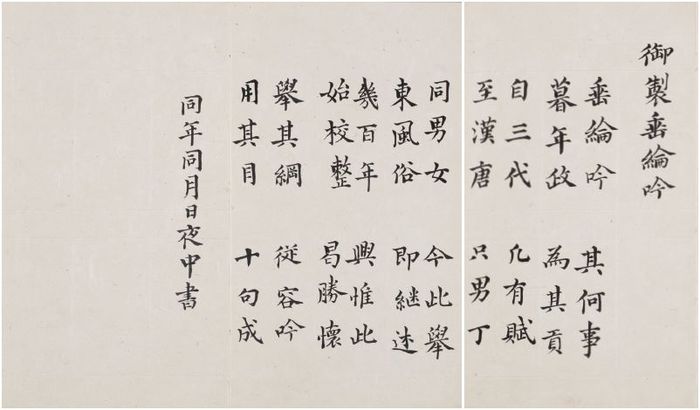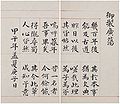"(Translation) 御製垂綸吟"의 두 판 사이의 차이
(→Secondary Sources) |
Kanghunahn (토론 | 기여) (→Introduction) |
||
| 26번째 줄: | 26번째 줄: | ||
=='''Introduction'''== | =='''Introduction'''== | ||
| − | This passage demonstrates King | + | This passage demonstrates King Yŏngjo's policy to exempt women from the taxation. On February 14, 1774 (50th year of King Yŏngjo), Kim Ŭngun suggested to King Yŏngjo that they should try to fix the chronic problem of the mistreatment of male/female slaves working at public facilities. Therefore, the king initiated the action, in which he abolished the system of levying tributes on women. At first, he put an end to the collection of tributes, namely, hemp cloth, from female slaves belonging to government offices/public stations, and further private female slaves owned by aristocrats (Yangban). Subsequently, he proceeded to release female shamans residing in Seoul from the burden of their tributes. |
| − | It is said that this measurement was initiated by the king's hearing an anecdote of a miserable lady called | + | It is said that this measurement was initiated by the king's hearing an anecdote of a miserable lady called Hongnyŏ, who ended up becoming a slave at a public station, and had to weave hemp cloth all night long, only to pay the tributes to the local government. On a fundamental level, however, there can be two major factors, which propelled King Yongjo to bring forth such action: 1) As he was one of the most scholarly monarchs of the Chosŏn dynasty, who was also well-versed in Confucian classics, he endeavored to emulate the precedents of ancient sages. In this regard, he realized that the Chinese rulers and elites, especially from the three dynasties to the Han and Tang periods, had not imposed taxes on women. Indeed, this led him to the abolition of women’s taxation, which had lasted over several hundreds of years in the Korean traditions. 2) It can be presumed that his family background might have played a critical role in the formation of his notions of Chosŏn’s female slaves in general. As is well known, his mother, namely, Sukpin Ch'oe, belonged to the lowborn class, and hence worked as a musuri (water maid) at the Chosŏn court. Furthermore, this constantly served as a major threat toward his royal authority as a whole. Therefore, such action must have been indispensable for him, in regard not only to his personal sympathy with female slaves, but also to keeping the legitimacy of his monarchical rule stable/intact. |
=='''Original Script'''== | =='''Original Script'''== | ||
2017년 7월 6일 (목) 23:02 판
| Primary Source | ||
|---|---|---|
 |
Title | |
| English | ||
| Chinese | 御製垂綸吟 | |
| Korean(RR) | 어제수윤음(Eoje suyuneum) | |
| Text Details | ||
| Genre | Royal Documents | |
| Type | ||
| Author(s) | King Yeongjo | |
| Year | 1774 | |
| Source | ||
| Key Concepts | King Yeongjo, | |
| Translation Info | ||
| Translator(s) | Participants of 2017 Summer Hanmun Workshop (Advanced Translation Group) | |
| Editor(s) | ||
| Year | 2017 | |
목차
- 1 Introduction
- 2 Original Script
- 3 Translation
- 3.1 Student 1 : (Kanghun Ahn, Hu Jing, King Kwong Wong, Zhijun Ren)
- 3.2 Student 2 : (Write your name)
- 3.3 Student 3 : (Write your name)
- 3.4 Student 4 : (Write your name)
- 3.5 Student 5 : (Write your name)
- 3.6 Student 6 : (Write your name)
- 3.7 Student 7 : (Write your name)
- 3.8 Student 8 : (Write your name)
- 3.9 Student 9 : (Write your name)
- 3.10 Student 10 : (Write your name)
- 3.11 Student 11 : (Write your name)
- 3.12 Student 12 : (Write your name)
- 3.13 Student 13 : (Write your name)
- 3.14 Student 14 : (Write your name)
- 4 Primary Sources: Veritable Records of the Joseon Dynasty
- 5 Secondary Sources
- 6 Further Readings
Introduction
This passage demonstrates King Yŏngjo's policy to exempt women from the taxation. On February 14, 1774 (50th year of King Yŏngjo), Kim Ŭngun suggested to King Yŏngjo that they should try to fix the chronic problem of the mistreatment of male/female slaves working at public facilities. Therefore, the king initiated the action, in which he abolished the system of levying tributes on women. At first, he put an end to the collection of tributes, namely, hemp cloth, from female slaves belonging to government offices/public stations, and further private female slaves owned by aristocrats (Yangban). Subsequently, he proceeded to release female shamans residing in Seoul from the burden of their tributes.
It is said that this measurement was initiated by the king's hearing an anecdote of a miserable lady called Hongnyŏ, who ended up becoming a slave at a public station, and had to weave hemp cloth all night long, only to pay the tributes to the local government. On a fundamental level, however, there can be two major factors, which propelled King Yongjo to bring forth such action: 1) As he was one of the most scholarly monarchs of the Chosŏn dynasty, who was also well-versed in Confucian classics, he endeavored to emulate the precedents of ancient sages. In this regard, he realized that the Chinese rulers and elites, especially from the three dynasties to the Han and Tang periods, had not imposed taxes on women. Indeed, this led him to the abolition of women’s taxation, which had lasted over several hundreds of years in the Korean traditions. 2) It can be presumed that his family background might have played a critical role in the formation of his notions of Chosŏn’s female slaves in general. As is well known, his mother, namely, Sukpin Ch'oe, belonged to the lowborn class, and hence worked as a musuri (water maid) at the Chosŏn court. Furthermore, this constantly served as a major threat toward his royal authority as a whole. Therefore, such action must have been indispensable for him, in regard not only to his personal sympathy with female slaves, but also to keeping the legitimacy of his monarchical rule stable/intact.
Original Script
| Classical Chinese | English |
|---|---|
|
御製垂綸吟 垂綸吟 暮年政 其何事 爲其貢 |
(translation) |
Translation
Student 1 : (Kanghun Ahn, Hu Jing, King Kwong Wong, Zhijun Ren)
御製垂綸吟 Royal Instruction of King Yǒngjo to be Handed Down to Future Generation
垂綸吟 暮年政 Leaving a legacy for future generation, I wrote down this instruction about the policy during the last years of my reign.
其何事 爲其貢 What is this about? It is about the taxation policy.
自三代 至漢唐 From the Three Dynasties[1] till the Han and Tang periods,
凡有賦 只男丁 Every taxation policy had only affected male adults.
同男女 東風俗 [On the contrary,] Taxing equally both men and women is the tradition of the East.[2]
今此舉 即繼述 Now this act is a continuation of [the Chinese practices in] the past.
幾百年 始校整 It was only after several hundreds of years that [this inconsistency with past practices] began to be rectified.
與惟此 曷勝懷 Solely through this way that my intention could be fulfilled.
舉其綱 用其目 Bringing up the essence and employing the details,
從容吟 十句成 I calmly completed this instruction in ten sentences.
同年同月日夜中書 In the same year, month, and day, written in the middle of the night.
Annotation
- ↑ The Three Dynasties refer to the Xia, Shang, and Zhou dynasties.
- ↑ Koreans referred to their own country as either Haedong (East of the Sea) or Tongguk (the Eastern Country).
- Discussion Questions:
Student 2 : (Write your name)
- Discussion Questions:
Student 3 : (Write your name)
- Discussion Questions:
Student 4 : (Write your name)
- Discussion Questions:
Student 5 : (Write your name)
- Discussion Questions:
Student 6 : (Write your name)
- Discussion Questions:
Student 7 : (Write your name)
- Discussion Questions:
Student 8 : (Write your name)
- Discussion Questions:
Student 9 : (Write your name)
- Discussion Questions:
Student 10 : (Write your name)
- Discussion Questions:
Student 11 : (Write your name)
- Discussion Questions:
Student 12 : (Write your name)
- Discussion Questions:
Student 13 : (Write your name)
- Discussion Questions:
Student 14 : (Write your name)
- Discussion Questions:
Primary Sources: Veritable Records of the Joseon Dynasty
1.영조실록 122권, 영조 50년 2월 14일 정유 3번째기사 1774년 청 건륭(乾隆) 39년
金應淳, 以寺奴婢痼弊, 建議陳白。 上欲盡革女貢之名, 寺婢驛婢貢及巫女布, 皆令除之, 私婢亦勿使收貢, 命廟堂議成節目, 廟議難於給代, 久不決。
臨殿臨門, 謀及卿士庶民, 而衆議甲乙, 汔無定見, 廼特敎減夫布一疋, 設廳均役, 收諸路魚鹽隱結之稅充其代。 又念女貢之非古, 一皆蠲除, 德音所被, 室家相慶, 有足以導揚和氣, 迓續景命矣。
愍玆赤子, 歲納布縷, 爲蠲其半, 以涵以煦, 爰發輶軒, 率彼海濱, 曰漁曰鹽, 無稅不均。哀此紅女, 名編驛婢, 夜織于機, 征入不巳。 乃降明諭, 悉減女貢, 永泮于歸, 百室歌誦。
4.정조실록 10권, 정조 4년 9월 24일 기해 1번째기사 1780년 청 건륭(乾隆) 45년
"活人署當初設立, 蓋以都下人民, 若有癘疫, 則使之救活, 而但本署元無財力, 京巫女若干身布, 自本署收捧, 以給員役一年料布。 先大王甲午, 罷女貢, 故京巫女貢, 亦隨而罷。
Secondary Sources
- 한국사상(韓國思想)(사학(史學)): 영조의 제왕학과 국정운영 History : King Yeongjo's own "Study for Kings" and his running of the government
- 영조의 제왕학과 『御製自省編』 King Yeongjo's Study and Eoje-jaseongpyeon(御製自省編)
- Haboush, JaHyun Kim. The Confucian Kinship in Korea: Yongjo and the Politics of Sagacity, New York: Columbia University Press, 2001.
- Hejtmanek, Milan. "Devalued Bodies, Revalued Status: Confucianism and the Plight of Female Slaves in Late Chosŏn Korea," Women and Confucianism in Choson Korea: New Perspectives, New York: SUNY Press, 2011




